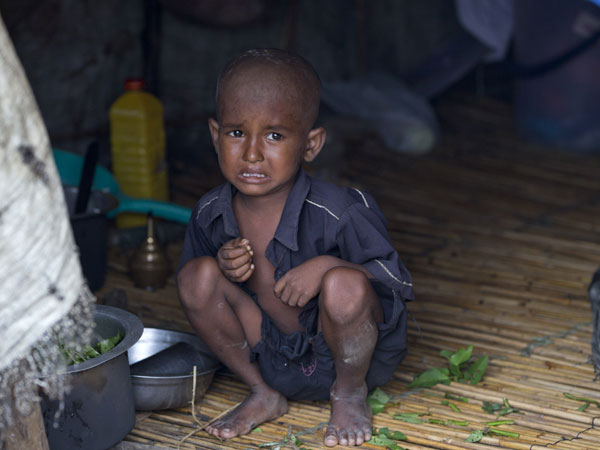Anti-Muslim riots rock western Myanmar

In this Sept. 17, 2013, photo, a Muslim boy, who became displaced following the 2012 sectarian violence, cries at Nga Chaung refugee Camp in Pauktaw, Rakhine state, Myanmar. President Thein Sein traveled to Myanmar’s conflict-torn west on Tuesday, Oct. 1, 2013 as a new spate of sectarian violence gripped the state of Rakhine, with police saying Buddhist rioters killed a 94-year-old Muslim woman and torched more than 70 homes. AP
YANGON—Anti-Muslim riots shook western Myanmar Tuesday with a mob of hundreds setting homes ablaze and stabbing a 94-year-old woman to death, police said, as President Thein Sein made a rare visit to the region.
Attacks against Muslims in Buddhist-majority Myanmar have overshadowed widely praised political reforms overseen by the former general since military rule ended in 2011.
Thein Sein, making his first trip to Rakhine state as president, was due to hold meetings with Buddhist and Rohingya Muslim communities during his two-day visit, according to a presidential office official.
Unrest began rippling through rural areas near the town of Thandwe in the early morning, with a mob of 800 ethnic Rakhine Buddhists from nearby villages descending on one settlement, according to a police official in the state who asked not to be named.
“They burned about 18 houses. After that a 94-year-old Kaman Muslim woman was stabbed (to death),” he said.
Article continues after this advertisementSeveral more homes were burned in another village, as security forces fired some 30 warning shots to disperse two opposing groups of Buddhists and Muslims that had formed near the police station.
Article continues after this advertisementHe said a military presence has been increased in the Thandwe area, which Thein Sein is due to visit on Wednesday.
Around 250 people have been killed and more than 140,000 left homeless in several outbreaks of violence around the country since June 2012, mostly in Rakhine.
Thein Sein, a former junta premier turned president, spent Tuesday visiting a different area of Rakhine populated mainly by stateless Rohingya Muslims.
“The main focus of the trip is the communal violence,” said the presidential official, who asked not to be named.
Rakhine police said the president is expected to visit camps for the displaced early Wednesday.
The latest unrest follows an argument over a parking space near a Muslim home last week in Thandwe town which triggered arson attacks against property owned by local Kaman Muslims, according to the authorities.
Clashes in Rakhine state in June and October last year left about 200 people dead, mostly Rohingya who are denied citizenship by Myanmar and viewed by the government and many local people as illegal immigrants from neighbouring Bangladesh.
The Kaman—an officially recognized minority in Myanmar—were also attacked in the October Rakhine violence. The conflict has since spiralled, with members of the wider Muslim community targeted in incidents across the country.
Reform at risk
Four major Myanmar Muslim organisations released an open letter to Thein Sein late Tuesday calling on the government to take urgent law enforcement action.
“The concerns of minority Muslims around the country have reached peak levels. They feel they have no security,” the letter said.
The International Crisis Group think-tank warned Tuesday that unless there is an effective government response and change in societal attitudes, the violence could spread and jeopardise the country’s transition.
“At a moment of historic reform and opening, Myanmar cannot afford to become hostage to intolerance and bigotry,” said Jim Della-Giacoma, ICG’s Asia program director.
“Those who are spreading messages of intolerance and hatred must not go unchallenged. Otherwise, this issue could come to define the new Myanmar, tarnishing its international image and threatening the success of its transition away from decades of authoritarianism.”
In several eruptions of unrest in Myanmar, armed mobs—including robed monks—have rampaged through villages attacking local Muslims and torching homes.
Anti-Muslim rhetoric, spread by radical Buddhist monks, has been on the rise and sparked international concern.
Last week visiting members of the Elders—former world leaders led by ex-US president Jimmy Carter—appealed for an end to impunity over a wave of anti-Muslim attacks.
Gro Harlem Brundtland, former prime minister of Norway and deputy chair of The Elders, warned it could take decades to overcome “the ingrained prejudices promoted by extremist voices in parts of the country.”
Rights groups have in the past accused Myanmar security forces of complicity in the violence—an allegation denied by the authorities.
Thousands of Rohingya boat people—including women and children—have fled the former junta-ruled country since last year, mostly heading for Malaysia on a perilous sea voyage.